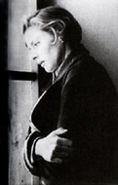In an upscale district of Rome, a cosmopolitan American socialite named Irene Girard (Ingrid Bergman) hurries home with her pet in tow and is greeted by the concierge with the inconvenient news that the elevator is again out of service. It is a perfunctory irritation for the carefree and sophisticated expatriate whose pressing engagement is revealed to be the hosting of an intimate dinner party with her husband George (Alexander Knox) that has now been revised to include the recent invitation of two additional guests: George’s aunt Margaret and her son, an intellectual and communist radical named André (Ettore Giannini). With little time before their friends arrive, Irene rushes to the bedroom in order to change into her evening clothes, only to be repeatedly accosted by her coddled, temperamental adolescent son Michel (Sandro Franchina) who sullenly – and unrelentingly – demands her undivided attention. However, with the gradual arrival of the dinner guests, Irene cursorily dismisses Michel who is relegated to his room for the evening, making only a brief, polite appearance to receive a gift train set which the young man accepts with visible indifference before summarily walking away. The vacuous and uneventful dinner is then disrupted by the housekeeper Cesira’s (Tina Perna) harried notification that Michel – perhaps in a desperate bid for attention – has fallen down a flight of stairs. The incident proves to be a turning point in Irene’s contented and self-absorbed bourgeois existence as her inconsolable grief becomes a catalyst for introspection and social conscience.
The second collaboration between Roberto Rossellini and Ingrid Bergman (after Stromboli), Europa 51 is a provocative, haunting, and compassionate examination of the isolating and often misunderstood path of personal redemption and spiritual service in contemporary society. Composed of alternating sequences of daytime and nighttime episodes (that would be similarly used by Federico Fellini in his subsequent film, La Dolce Vita), the film presents a recurring visual dichotomy that illustrates the polarizing division between wealth and poverty, spirituality and materialism, vanity and humility, selfishness and benevolence: Irene’s evening conversation with André that results in her financial assistance of the Puglisi family on the following day; her overnight care for a consumptive prostitute named Ines (Teresa Pellati) after encountering her in the red light district; her return visit to the Puglisi family home on the chaotic night of a bank robbery. Similarly, the Girard family’s emotionally reserved and veiled expression of disapproval over Irene’s charitable actions over cocktails that contrasts with the festive atmosphere of the Puglisi family’s overcrowded apartment as their son returns home from the hospital further reflects Irene’s disconnection from her staid, rarefied social environment of the privileged class in postwar Europe, and her gravitation towards a simpler and more nurturing peasant community. In essence, as Irene leads an increasingly humble life of service to humanity, her existence figuratively becomes one of cloistered monasticism. In the exquisite and profoundly moving final sequence, Irene, abandoned by her family, finds solace and renewed purpose in the affectionate cries of her adoring and devoted surrogate family. Framed against the bars of a mental institution, her contemplative image – bathed in sunlight – becomes one, not of captivity, but of benediction and enlightenment.
© Acquarello 2003. All rights reserved.
